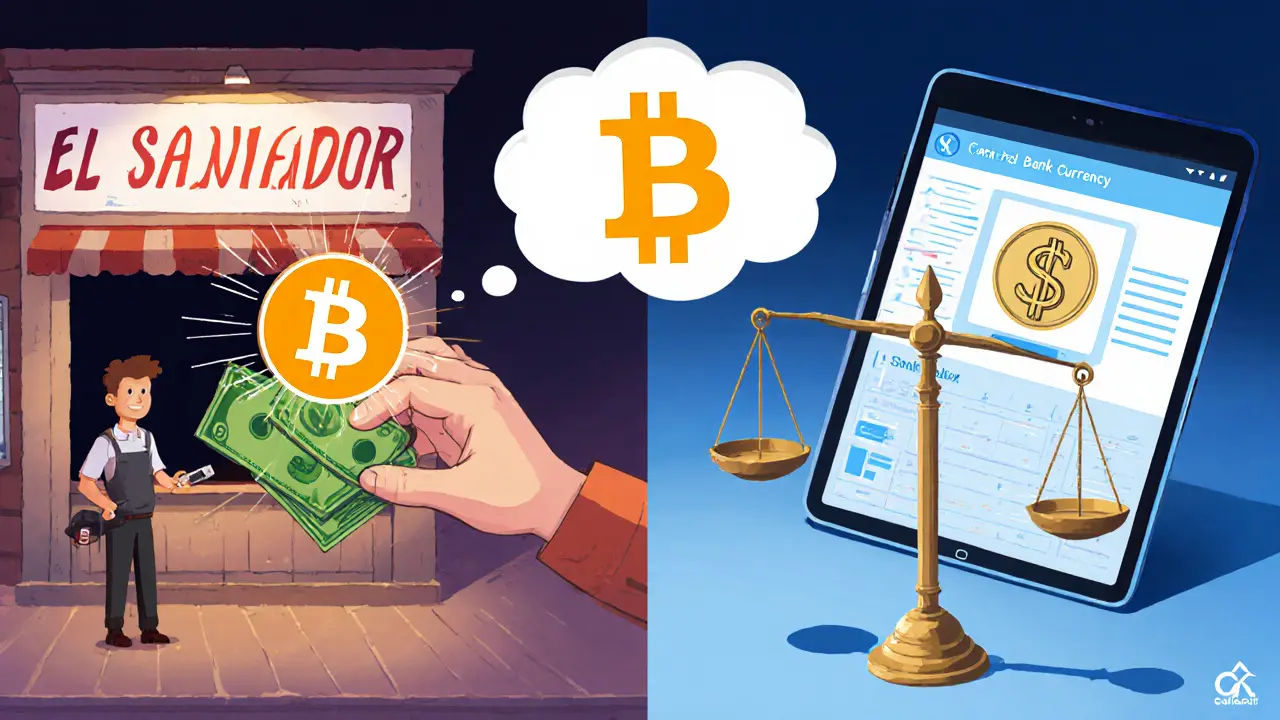Bitcoin Adoption Impact Calculator
About This Tool
Based on data from El Salvador's Bitcoin legal tender implementation, this calculator shows how adoption rates and conversion behaviors impact the economy. Use the sliders below to see potential outcomes based on current real-world data (20% business adoption, 88% conversion to USD).
Current rate: 20% of businesses accept Bitcoin
Current rate: 88% of transactions converted immediately
Current average growth: 5% per year
Projected Economic Impact
Note: Calculations based on article data:
- Current business adoption rate: 20%
- 88% of transactions converted to USD immediately
- 2.6 ATM withdrawals per active user monthly
- Only 5% of sales conducted in Bitcoin
When El Salvador's Bitcoin legal tender law made Bitcoin a legal tender alongside the US dollar in 2021, the world took notice. The law forces every economic agent to accept Bitcoin when offered, a move that turned traditional monetary thinking upside‑down. The El Salvador Bitcoin law created a real‑world test case for the clash between decentralized crypto and sovereign monetary policy.
What the law actually requires
The legislation, especially Article 7, obliges merchants, service providers, and even government agencies to accept Bitcoin as payment for goods, services, and taxes. An automatic conversion system swaps Bitcoin for US dollars instantly for accounting purposes, but the legal tender status remains intact. The government rolled out the Chivo Wallet a mobile app that lets Salvadorans hold, send, and receive Bitcoin with a $30 bonus to jump‑start adoption.
International monetary authority reactions
Global financial watchdogs reacted with a mix of alarm and caution. The International Monetary Fund the UN‑based organization that monitors global monetary stability warned that the forced‑tender approach could destabilize the country’s macro‑economy, citing risks of volatility and limited regulatory oversight. The World Bank echoed similar concerns, emphasizing the need for a clear anti‑money‑laundering framework before any crypto‑centric policy could be deemed safe.
| Institution | Stance | Main Concern |
|---|---|---|
| International Monetary Fund | Critical | Volatility and forced tender risks |
| World Bank | Warned | AML/CTF compliance gaps |
| Financial Action Task Force | Neutral‑to‑Cautious | Cross‑border crypto flows |
Legal scholars weigh in on forced tender
Legal experts highlighted fundamental contradictions with established property‑rights doctrine. Dror Goldberg professor of law known for research on compulsory tender argued that forcing merchants to accept a decentralized asset violates the freedom of contract, a principle most jurisdictions protect. He noted that in the United States, credit‑only businesses can legally refuse cash, a flexibility that El Salvador’s law eliminates for Bitcoin.

Crypto community’s enthusiastic endorsement
Within the cryptocurrency community global network of developers, investors, and enthusiasts, the law was touted as a historic validation of Bitcoin’s status as “digital gold.” Prominent Bitcoin advocates called the move a pioneering step that could spark a wave of sovereign crypto adoption, arguing that the experiment would prove Bitcoin’s utility for remittances and financial inclusion.
On‑the‑ground adoption data
Academic studies reveal a sobering picture. Research compiled in NBER the US National Bureau of Economic Research Working Paper 29968 shows that while half of households initially downloaded the Chivo Wallet, 60 % never conducted a transaction after using the free Bitcoin bonus. Only about 20 % of firms actually accept Bitcoin in practice, and a striking 88 % of those that do convert the crypto to US dollars immediately, underscoring lingering mistrust in Bitcoin as a store of value.
Demographic analysis indicates that early adopters tend to be younger, educated, and already banked-hardly the unbanked population the policy aimed to reach. The average active user makes roughly 2.6 ATM withdrawals per month, suggesting that a small core of users drives most activity.
Comparing Bitcoin with Central Bank Digital Currencies
While El Salvador experiments with a decentralized asset, many nations are launching Central Bank Digital Currency a government‑issued digital form of fiat money. The Bahamas’ Sand Dollar, Nigeria’s e‑Naira, and Jamaica’s Jam‑Cash all maintain full backing by the central bank, preserving monetary policy control. By contrast, Bitcoin’s supply caps at 21 million and its network is outside any sovereign oversight, meaning El Salvador effectively cedes some monetary sovereignty to a global protocol.
International policymakers see this contrast as a cautionary tale. The IMF’s 2023 Digital Currency Outlook stresses that CBDCs can improve payment efficiency without exposing economies to crypto volatility, a point highlighted by the limited real‑world use of Bitcoin in El Salvador despite legal compulsion.

Future implications for global policy
Should El Salvador eventually meet its goals-greater financial inclusion, cheaper remittances, and increased national wealth circulation-the experiment could inspire other developing economies facing currency instability. However, current data suggest the model needs tweaking: lower conversion fees, stronger consumer protection, and perhaps a hybrid approach that blends Bitcoin’s borderless benefits with a stable CBDC foundation.
Consulting firms like PwC global professional services network label the case study as “early but insightful,” emphasizing that any replication will likely adopt stricter AML/CTF safeguards and a more gradual rollout.
Key takeaways
- International financial bodies view the law as risky due to volatility and forced‑tender mechanics.
- Legal scholars question its compatibility with property‑rights principles.
- The crypto community praises the boldness but acknowledges practical adoption challenges.
- Empirical evidence shows modest household uptake and heavy reliance on instant dollar conversion.
- Comparison with CBDCs highlights the trade‑off between decentralization and monetary control.
Frequently Asked Questions
What does El Salvador's Bitcoin legal tender law require?
The law obliges all merchants, service providers, and government entities to accept Bitcoin as payment when offered, alongside the US dollar. It also allows tax payments and debt settlement in Bitcoin.
How have international organizations responded?
The IMF and World Bank have issued warnings about macro‑economic risks and highlighted gaps in anti‑money‑laundering compliance. They suggest a cautious approach before wider adoption.
Is Bitcoin widely used in everyday transactions in El Salvador?
Only about 20 % of businesses actually accept Bitcoin, and roughly 5 % of sales are conducted in Bitcoin. Most received Bitcoin is instantly converted to US dollars.
How does this experiment compare to CBDCs?
CBDCs are government‑backed digital versions of fiat currency, preserving monetary policy control. Bitcoin, by contrast, is decentralized and volatile, meaning El Salvador cedes some sovereignty to a global protocol.
What are the prospects for other countries?
Other developing nations are watching closely. The mixed results suggest any future adoption will likely be more measured, possibly blending crypto benefits with a stable CBDC framework.

19 Comments
Roxanne Maxwell
It's wild to think about how much this experiment changed everyday life for regular folks in El Salvador. I met a guy from San Miguel last year who said his mom still uses cash for everything, but his little sister buys coffee with Bitcoin every morning. She says it feels like magic, even if the app glitches sometimes. I just wish more people talked about the human side instead of just the economics.
Jonathan Tanguay
Okay so let me get this straight-El Salvador made Bitcoin legal tender but 88% of people who get it immediately convert it to USD?? That’s not adoption that’s just a glorified ATM service with extra steps. And the IMF was right to panic-this isn’t innovation it’s financial chaos wrapped in a crypto hoodie. You can’t force people to accept a volatile asset and then act surprised when nobody uses it. This isn’t a revolution it’s a dumpster fire with a blockchain logo. Also why is the government even involved in wallets? That’s not decentralization that’s state-sponsored crypto cronyism.
Ayanda Ndoni
Man I just watched a video of this Chivo Wallet guy trying to pay for a taco and the app crashed three times. He ended up giving cash and the vendor gave him side-eye like he was trying to pay with Monopoly money. Feels like they spent millions on a solution nobody wanted. Why not just fix the banking system? Or even just lower remittance fees? This whole thing feels like a billionaire’s weekend project gone wrong.
Elliott Algarin
There’s something poetic about a small nation betting its economic future on a decentralized protocol nobody controls. It’s like standing on a cliff and jumping into the ocean hoping the water’s deep enough. Whether it works or not, it’s forced the world to ask: what even is money? And who gets to decide? Maybe the answer isn’t in laws or wallets but in trust. And trust is harder to code than blockchain.
John Murphy
Interesting how the people who actually use Bitcoin are the ones already banked. The whole point was supposed to be helping the unbanked but it ended up being a tool for the tech-savvy. Makes you wonder if the policy was designed for people or for headlines. Also the $30 bonus feels like a gimmick-like free samples at the grocery store but for cryptocurrency.
Zach Crandall
One cannot help but observe the profound irony of a sovereign state attempting to assert monetary autonomy through a system that is explicitly designed to be ungovernable. The very architecture of Bitcoin-its immutable supply, its decentralized validation, its resistance to jurisdictional control-renders the notion of legal tender status a semantic farce. One does not marry a nomad and expect them to obey your house rules.
Akinyemi Akindele Winner
El Salvador didn’t go full crypto-they went full clown show. Bitcoin ain’t digital gold, it’s digital lottery ticket with a side of chaos. The government gave out free Bitcoin like it was confetti at a wedding… and now half the country’s using it to buy phone credits and the other half is just waiting for the next crash. Meanwhile, the IMF’s over there in their suits sipping tea like they told you so. Yeah you did. But at least they tried something wild. Most countries are still stuck in 1998.
Patrick De Leon
Let’s be honest-the only reason this worked as long as it did was because the US dollar was still the real backbone. Bitcoin’s just a shiny distraction. If this was done by a country that didn’t have dollar backing? It would’ve collapsed in weeks. This isn’t innovation. It’s financial tourism. And the fact that the World Bank is still talking about AML? That’s like worrying about the color of the parachute while the plane is still on the runway.
MANGESH NEEL
Oh wow so now we’re giving free crypto to people who don’t even understand what it is? And we wonder why the poor stay poor? This isn’t financial inclusion-it’s financial exploitation dressed up as progress. The government hands out Bitcoin like candy and then acts like they’re heroes? Meanwhile, the real problem-corruption, poor infrastructure, lack of education-is still there. This is the kind of performative policy that makes the world laugh at us. And the crypto bros? They’re just happy someone else is paying for their experiment.
Sean Huang
They didn’t just make Bitcoin legal tender-they handed over monetary sovereignty to a shadowy network of miners in China and Kazakhstan. This is the first step. Next thing you know, the Fed’s gonna be forced to accept Dogecoin. The elites are setting up a global cashless system where your money is controlled by algorithms, not people. The Chivo Wallet? It’s a Trojan horse. Every transaction is tracked. Every balance monitored. They’re not giving you freedom-they’re giving you a digital leash. Wake up. This is the New World Order with a blockchain logo.
Ray Dalton
Look, the adoption numbers are low-but that doesn’t mean it’s a failure. Every big tech shift starts slow. Remember when people thought email was just for nerds? Bitcoin in El Salvador is like the first iPhone: clunky, misunderstood, but still a glimpse of something bigger. The real win? It got people talking. It got developers building. It got governments paying attention. Maybe the next version won’t force adoption. Maybe it’ll just make it easier. And that’s how change happens.
Peter Brask
OMG you guys 😱 The Chivo Wallet is literally a government spy tool disguised as crypto. They’re tracking every single transaction. And the $30 bonus? That’s bait. Once you’re hooked, they’ll start charging fees, then freeze your account, then take your Bitcoin. This is how they build the digital surveillance state. Also, the IMF is just jealous because they don’t control Bitcoin. The real enemy isn’t volatility-it’s central banks. We’re in the Matrix and El Salvador just pulled the plug. 🤯
Trent Mercer
Let’s be real-this was always going to fail. You can’t mandate adoption of something that’s too volatile, too complex, and too disconnected from people’s daily lives. It’s like forcing everyone to use a new language. The fact that 88% convert to USD proves one thing: people trust the dollar more than a digital coin mined by strangers. This isn’t a revolution-it’s a PR stunt with a blockchain sticker on it.
Kyle Waitkunas
THEY DIDN’T EVEN TELL YOU THE TRUTH ABOUT THE CHIVO WALLET!! 😭 The app was secretly linked to a private server in Miami owned by a shell company connected to a former Goldman Sachs exec who also advised the IMF. Every Bitcoin transaction was being logged, geo-tagged, and sold to data brokers. The $30 bonus? It was a honeypot. The whole thing was a test run for global financial surveillance. The fact that people didn’t use it? That’s because they sensed it. The system is rigged. The government is a puppet. And you? You’re just a data point. Wake up before they make your bank account crypto-only.
vonley smith
It’s not perfect, but it’s a start. Most countries are too scared to try anything new. El Salvador said ‘let’s see what happens’ and that’s brave. Even if only 20% of shops use it, that’s 20% more than before. And hey-maybe next year, the fees drop, the app gets better, and more people stick with it. Progress isn’t about winning on day one. It’s about showing up anyway.
Melodye Drake
It’s so disappointing that a country with such rich cultural history chose to chase a speculative asset instead of fixing its real problems-infrastructure, education, corruption. Bitcoin doesn’t build schools. It doesn’t fix roads. It doesn’t feed children. This feels less like innovation and more like a desperate attempt to look ‘modern’ while ignoring the real needs of its people. The world should be applauding their courage… but instead, we’re just shaking our heads.
paul boland
El Salvador didn’t go full crypto-they went full Irish. You know what we do? We say ‘sure go on then’ and then watch the whole thing collapse. And then we laugh. And then we go get a pint. Bitcoin? Fine. But let’s be honest-this is just another ‘let’s see what happens’ experiment. And guess what? It happened. And now we’re all watching. Cheers to that. 🍻
harrison houghton
There is a fundamental philosophical error embedded in the premise of this law. To declare a decentralized, non-sovereign asset as legal tender is to confuse mechanism with meaning. Money is not merely a medium of exchange-it is a social contract. By delegating that contract to an algorithm, El Salvador has surrendered the moral authority of currency. The state no longer stands behind the value of its money. It has outsourced sovereignty to an anonymous network. This is not progress. This is abdication.
DINESH YADAV
Why are you all acting like this is some kind of big deal? In India we have UPI-instant, free, government-backed digital payments used by over 800 million people. No volatility. No crypto nonsense. No forced adoption. Just simple, reliable tech. El Salvador’s Bitcoin mess is a joke. Real innovation doesn’t need to be risky. It just needs to work. And UPI works. End of story.